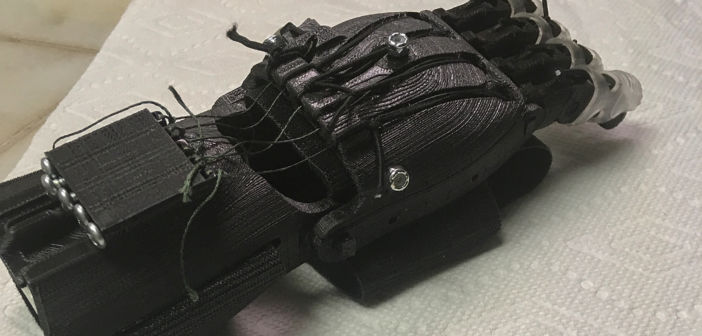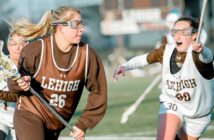A small child without a hand sits at a table strewn with multiple parts. She’s screwing in one segment to another with the help of her parents. Some may think she is playing with a toy or piecing together a puzzle, but the girl is actually building her own hand and forearm through Enabling the Future, a new chapter of a national organization that has been established at Lehigh.
Enabling the Future allows local children in need to 3-D print their own hands and arms.
The organization’s goal is to help children in lower-income families gain abilities they previously lost or did not have, free of cost.
“Why would you spend over $3,000 for a fancy prosthetic that a kid will outgrow in a year or two when you could easily print one for $100,” asked Bonaire Berry, ’18, the chair of the outreach committee.
The cost can add up for children who are active and growing, as prosthetic limbs can easily break or become uncomfortable. It would be more cost effective to print a replacement part or the entire appendage if it were damaged, especially because it is not possible for most families to continually spend thousands of dollars, said Whitney Lai, ’16, the president of Enabling the Future.
The process begins when a family submits a request through Enabling the Future’s website. Each request is sent to the nearest chapter, which then takes the child’s measurements and proceeds to 3-D print the hand.
“Part of the organization is to enable the kids to do it themselves,” Berry said.
The kids help print their own appendages and are encouraged to assemble them themselves.
The organization’s founder coded designs for various parts of the arm and has uploaded them online, so they are available for all chapters to use. Each chapter simply needs to adjust measurements according to each child’s needs. The hand takes about a day or two to print and a few hours to assemble.
“The tutorials are all done by little kids showing us how to print and build what they need,” Lai said.
Enabling the Future was founded in 2013 and is made up of a community of worldwide volunteers. According to the organization’s website, the first 3-D printed hand for a child born without fingers was developed by two men living 10,000 miles apart.
The national organization has monthly Design Challenges, coined CREATE T.I.M.E. — Think. Imagine. Make. e-NABLE. — in which chapters make improvements or add functions to current designs. The challenge for January 2017 asked participants to develop task-specific tools that can be attached to the python utility hand, which is described as a “Swiss-army-type device” that can be used more like a tool than a hand.
The current uploaded codes build hands that only execute simple grasping motions.
“We’re hoping to design appendages that could attach and replace fingers to do certain things, like brush your teeth,” said Amanda Stratton, ’18, the chair of the education committee. “We could also work on making the design more sleek.”
Lehigh allows Enabling the Future to use the 3-D printers in Wilbur Powerhouse and provides the filament needed to create the hands. The chapter could purchase better filament, which would have to come out of the organization’s funds, Berry said.
The chapter will host a Make and Take event on March 10 where students can make 3-D printed bracelets and key chains. They will also host future fundraising events, such as keeping The Goose open late.
Enabling the Future is planning an educational outreach program with local middle and high schools to get students more involved in STEM disciplines. They want students to learn how to put the hands together themselves as well as about the printing process as a whole.
“I want them to feel empowered from doing something amazing and helping others,” Lai said.






Comment policy
Comments posted to The Brown and White website are reviewed by a moderator before being approved. Incendiary speech or harassing language, including comments targeted at individuals, may be deemed unacceptable and not published. Spam and other soliciting will also be declined.
The Brown and White also reserves the right to not publish entirely anonymous comments.